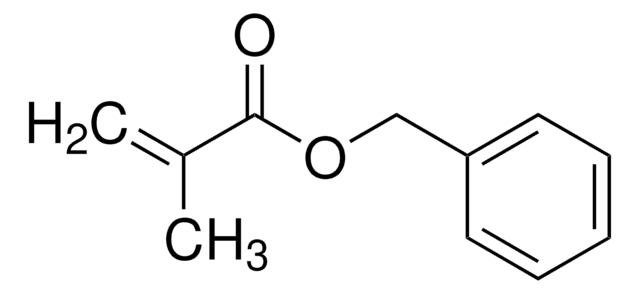235865
Butyl methacrylate
99%, contains monomethyl ether hydroquinone as inhibitor
About This Item
Produits recommandés
Densité de vapeur
4.91 (15 °C, vs air)
Niveau de qualité
Pression de vapeur
2 mmHg ( 20 °C)
Pureté
99%
Forme
liquid
Température d'inflammation spontanée
562 °F
Contient
monomethyl ether hydroquinone as inhibitor
Limite d'explosivité
2-8 %
Indice de réfraction
n20/D 1.423 (lit.)
Point d'ébullition
162-165 °C (lit.)
Densité
0.894 g/mL at 25 °C (lit.)
Température de stockage
2-8°C
Chaîne SMILES
CCCCOC(=O)C(C)=C
InChI
1S/C8H14O2/c1-4-5-6-10-8(9)7(2)3/h2,4-6H2,1,3H3
Clé InChI
SOGAXMICEFXMKE-UHFFFAOYSA-N
Vous recherchez des produits similaires ? Visite Guide de comparaison des produits
Description générale
Application
- A Monomer to synthesize waterborne butyl methacrylate (co)polymers latexes via emulsion polymerization for the development of coating materials for slow release-fertilizers.
- A matrix polymer in the preparation of LDH/poly (butyl methacrylate) nanocomposites, which can improve the mechanical properties and thermal stability of the resulting nanocomposites.
- A monomer to synthesize styrene and butyl methacrylate copolymers for use in leather finishing. Increasing the BMA content of the copolymer increases the water resistance and decreases the water vapor permeability of the leather.
- A monomer for the preparation of monolithic columns on microfluidic chips. These columns can be used for a wide range of applications, such as the separation and analysis of complex mixtures of compounds, the preconcentration of samples, and the development of new microfluidic analytical devices.
Mention d'avertissement
Warning
Mentions de danger
Conseils de prudence
Classification des risques
Eye Irrit. 2 - Flam. Liq. 3 - Skin Irrit. 2 - Skin Sens. 1 - STOT SE 3
Organes cibles
Respiratory system
Code de la classe de stockage
3 - Flammable liquids
Classe de danger pour l'eau (WGK)
WGK 1
Point d'éclair (°F)
119.3 °F - closed cup
Point d'éclair (°C)
48.5 °C - closed cup
Équipement de protection individuelle
Eyeshields, Faceshields, Gloves, type ABEK (EN14387) respirator filter
Faites votre choix parmi les versions les plus récentes :
Déjà en possession de ce produit ?
Retrouvez la documentation relative aux produits que vous avez récemment achetés dans la Bibliothèque de documents.
Les clients ont également consulté
Articles
Tissue engineering has become a key therapeutic tool in the treatment of damaged or diseased organs and tissues, such as blood vessels and urinary bladders.
Notre équipe de scientifiques dispose d'une expérience dans tous les secteurs de la recherche, notamment en sciences de la vie, science des matériaux, synthèse chimique, chromatographie, analyse et dans de nombreux autres domaines..
Contacter notre Service technique













